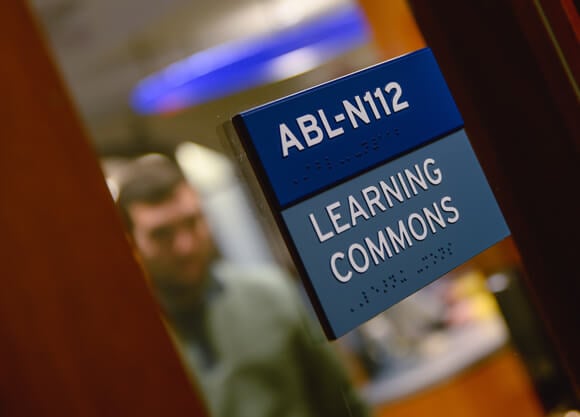
The Learning Commons: Championing student success to reduce anxiety
July 29, 2024

July 29, 2024

Managing Quinnipiac’s Learning Commons, Delohery works with several teams to provide opportunities for academic practice. One is the staff of the Office of Academic Development and Outreach where academic coaches and specialists are committed to helping students develop, plan and reach their full potential. Inviting students to be partners in their own development process is a crucial ingredient.
“Our staff encourages students to think of the Learning Commons as a gymnasium, not a hospital where you visit because something is wrong. The Learning Commons is a gym where you discover and build on your strengths and practice with support, just as an athlete would before a game or a musician before a recital,” said Delohery, associate vice president of retention and academic success. “The process we utilize is called Appreciative Advising. It’s more about recognizing and building the skills, the muscle memory and the sense of self to help you reach your goals and develop the tools needed for success in college, career and life."
Through the Learning Commons, professional academic coaches work specifically with first-year students, starting at orientation and carrying through their entire first year.
Even before COVID, Delohery and his team were preparing to welcome Gen Z students to campus as they arrived with their own particular set of values and generational characteristics. Those factors now include a rise in students reporting anxiety, which has increased since the pandemic with the added pressures of technology and social media influences.
“For many, college is the first time they’re living away from their families and communities. They’re suddenly presented with new surroundings, social situations and a heavy academic workload and many become overwhelmed,” said Delohery. “Some try to cope by avoiding certain stressors. They skip class, ignore assignments and engage in other choices of disassociation such as binge-watching TV or playing video games.”
Academic coaches are certified in Appreciative Advising and assigned to specific schools and programs so that they are familiar with the particular requirements of that area of study. The coaches guide and model ways to tackle issues like test anxiety, procrastination, organization issues and help students build the skill set needed to adapt to a variety of situations.
Delohery notes that while some anxiety is good and can motivate people to work harder, too much can lead to depression or diagnosed anxiety disorders. Using Appreciative Advising, academic coaches can help students develop those skills and mindsets to manage their anxiety. Working with coaches as partners in the process, students see their choices result in success, which promotes growth in confidence and self-efficacy, very necessary life skills.
“I want to be clear. This doesn’t replace accommodations that students may discuss with our Office of Student Accessibility,” said Delohery. “It's an additional tool that is helpful to everyone. That is why we meet with every first-year student during summer orientation. We care deeply about the overall health and wellbeing of our students and this program is a natural fit in helping them better handle the anxiety that can become a barrier to learning.”
Through the Learning Commons, students work with their own academic coach to create a personalized improvement plan designed to capitalize on their strengths, improve opportunity areas and help achieve course and learning goals. Appreciative Advising helps to build resilience, enhance well-being and empower individuals to take control of their own lives and future.
“It's always been important for students to take some degree of initiative and begin to explore that suite of executive functioning tools, like prioritization, future focus, goal setting, delayed gratification and goal development,” said Delohery. “It's even more important to focus on the tools that help an individual problem solve on their own.”
Delohery explains that the process establishes foundational knowledge before gradually building upon that framework. Similar to the temporary scaffolding used in construction for workers to stand on while they put up new walls and ceilings, the scaffolding is eventually removed as the building is complete.
“These developing skills and values support students in areas of their life beyond academic achievement,” said Delohery. “Such as career exploration and choice, interpersonal relationships and managing stress, which are all important student goals.”
Using Appreciative Advising, academic coaches provide a supportive structure for students as they transition to college. The coaches gradually remove their influence as students learn to stand and function on their own. Step by step, the process inspires confidence over anxiety.
“It doesn't happen overnight,” said Delohery. “But education is structured to offer support so that students can practice something new in a safe environment before building upon those skills to reach new levels and goals.”
After the initial meetings at orientation, communication is ongoing between coaches and students throughout the summer. Delohery encourages first-year students to regularly check their Quinnipiac email and get in touch with their coach now so that they’re better prepared when they arrive on campus for the fall semester.
“We’re trying to get each student to the point where they can process information on their own, to the point where they are self-sufficient,” said Delohery. “I guess you could say our goal is that students will develop the skills they need to work independently. And ultimately, they won't need us anymore.”
Quinnipiac Today is your source for what's happening throughout #BobcatNation. Sign up for our weekly email newsletter to be among the first to know about news, events and members of our Bobcat family who are making a positive difference in our world.
Sign Up Now